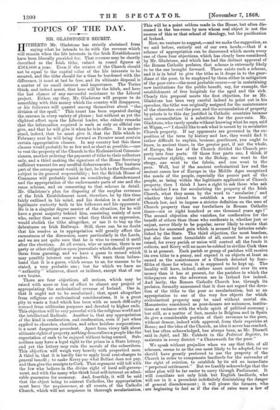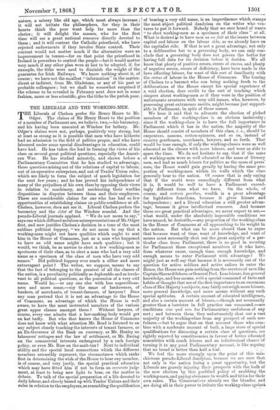TOPICS OF THE DAY.
MR. GLADSTONE'S SECRET.
HITHERTO Mr. Gladstone has strictly abstained from saying what he intends to do with the revenue which will remain when the life interests in the Irish Establishment
have been liberally provided for. That revenue may be shortly described as the Irish tithe, valued in round figures at £364,000 a year. Even if the estates of the Church should
not be equal to the capital value of the life interests to be
secured, and the tithe should for a time be burdened with the difference, it must at last be free, and its ultimate disposal is a matter of no small interest and importance. The Tories think, and indeed assert, that here will be the hitch, and here the last chance of any successful resistance to the Liberal project. Either, say they, Mr. Gladstone will propose to do something with this money which the country will disapprove, or his followers will quarrel among themselves about "the.
division of the spoil." This taunt has been repeated during the canvass in every variety of phrase ; but without as yet the slightest effect upon the Liberal leader, who calmly remarks
that the information required is such as only an official can give, and that he will give it when he is in office. It is under- stood, indeed, that he must give it, that the Bills which in February next he will bring forward as Premier must contain certain appropriation clauses. In any country but this these clauses would probably be as few and as short as possible,—one to vest the property of the Church in the Ecclesiastical Commis- sioners, another ordering the payment of tithe to their collectors only, and a third making the signature of the Home Secretary sufficient warrant for any needful disbursements. The business part of the arrangement would, in fact, be left to the Executive, subject to its general responsibility ; but the British House of Commons will probably insist on considering disendowment and the appropriation of the endowments parts of one and the same scheme, and on consenting to that scheme in detail. Mr. Gladstone's plan for disposing of the surplus revenues of the Irish Establishment mast, therefore, be by this time fairly outlined in his mind, and his decision is a matter of legitimate curiosity both to his followers and his opponents. He is in a singular degree master of the situation, for he will have a great majority behind him, consisting mainly of men who, rather than not remove what they think an oppression, would abolish the tithe altogether, or use it to buy up the debentures on Irish Railways. Still, there can be no doubt that his resolve as to appropriation will greatly affect the earnestness of the discussion, more particularly in the Lords, and we are not quite sure that he is wise to conceal it until after the elections. At all events, wise or unwise, there is no party or other obligation upon journalists which should prevent them from guessing, and we have a guess to record which may possibly interest our readers. We warn them before- hand that it is a guess, which seems to us, for reasons to be stated, a very probable one ; but for which we have no " authority " whatever, direct or indirect, except that of our own brains.
There are four objections, all serious, which may be raised with more or less of effect to almost any project of appropriating the ecclesiastical revenue of Ireland. One is, that it ought not to be secularized ; that, apart altogether from religious or ecclesiastical considerations, it is a great pity to waste a fund which has been with so much difficulty rescued from utilitarian purposes and devoted to higher ends. This objection will be very powerful with the religious world and the intellectual Radicals. Another is, that any appropriation of the kind is confiscation, and confiscation, even if just when applied to churches, charities, and other heirless corporations, is a most dangerous precedent. Apart from viewy talk about ultimate rights of property, nothing demoralizes a people like the expectation of cash to be enjoyed without being earned. Sub- scribers may have a legal right to the prizes in a State lottery, and yet the lottery may ruin the morale of the subscribers. This objection will weigh very heavily with propertied men. A third is, that it is hardly fair to apply local rent-charges to general benefit ; to make Kerry pay what Belfast does not pay, and than give the receipts to Cork. That argument will tell with the few who believe in the divine right of local self-govern- ment, and with the many who think local self-interest an admi- rable guarantee for economy. And, fourthly, it will be said that the object being to content Catholics, the appropriation must have the acquiescence, at all events, of the Catholic Church, which will not acquiesce in thorough secularization.
This will be a point seldom made in the House, but often dis- cussed in the tea-room by men whose real object is not the success of this or that school of theology, but the pacification of Ireland.
Now, we venture to suggest,—and we make the suggestion, as. we said before, entirely out of our own heads,—that if a scheme of appropriation can be discovered which meets every one of these four objections, which has clearly been considered by Mr. Gladstone, and which has had the distinct approval of the Roman Catholic prelates, that scheme is extremely likely to be the one brought forward. There exists such a scheme, and it is in brief to give the tithe as it drops in to the guar- dians of the poor, to be employed by them either in mitigation of the poor-rate—the most probable course—or in maintaining new institutions for the public benefit, say, for example, the establishment of free hospitals for the aged and the sick. Clearly this proposal meets the first objection, for as Mr. Gladstone has been very careful indeed to point out in his speeches, the tithe was originally assigned for the maintenance of the churches and the poor, and the accumulation of property by priests is to this day justified in Catholic countries because such accumulation is a substitute for the poor-rate. Mr. Gladstone, who rarely speaks without knowing what he says, said at Wigan,—" I should like to ask what is meant by to secularize Church property. If my opponents are governed in the ex- position of the term by history and law, they would find it rather difficult to explain, because, gentlemen, you ought to know, in ancient times, in the greater part, if not the whole, of Europe, the law of the Church divided the Church pro- perty into four parts.' Of those four parts one, I think, if I remember rightly, went to the Bishop, one went to the clergy, one went to the fabric, and one went to the poor. Well, but if the ancient ecclesiastical law and the ancient canon law of Europe in the Middle Ages recognized the needs of the people, especially the poorer part of the people, as being within the legitimate application of Church property, then I think I have a right to ask those who ask me whether I am for secularizing the property of the Irish Church, what they mean by the word to secularize ;' and whether they intend to establish a new foundation of Church law, and to impose a stricter definition on the uses of Church property than our forefathers in Roman Catholic times—six or eight hundred or one thousand years ago ?" The second objection also vanishes, for confiscation for the benefit of others than those who confiscate is, whether just or unjust, never likely to be popular, never likely to excite that passion for unearned gain which is aroused by lotteries estab- lished by the State. The third objection, the most baseless, but also the most formidable of all, cannot be so much as raised, for every parish or union will control all the funds it collects, and Kerry will no more be robbed to civilize Cork thai. it is at present. Each parish or group of parishes will receive its own tithe to a penny, and expend it on objects at least as sacred as the maintenance of a Church detested by four- fifths of those for whom it is supposed to be kept up. The locality will have, indeed, rather more control over its own money than it has at present, for the parishes in which the tithepayers own the advowson are in Ireland few indeed. And lastly, the Roman Catholic Church has, through its. prelates, formally announced that it does not regard the devo- tion of the tithe to the poor as secularization, but as an appropriation to one of the very few objects for which ecclesiastical property may be used without mortal sin. Monasteries considered as poor-houses are nuisances, institu- tions at variance with the whole spirit of political economy ; but still, as a matter of fact, monks in Belgium and in Spain do give a considerable portion of their revenues to the poor, without demur, indeed with approval, from their superiors at Rome; and the idea of the Church, an idea it never has reached, but has often acknowledged, has always been, as Mr. Disraeli said in Sybil, and Mr. Cobbett in the Political Register, to maintain in every district "a Chatsworth for the poor."
We speak without prejudice when we say that this, of all schemes, seems to us the one most likely to be adopted, for we should have greatly preferred to use the property of the Church in order to compensate landlords for the surrender of the right of eviction, to establish by its aid an immediate "perpetual settlement." But we frankly acknowledge that the other plan will be far easier to carry through Parliament. It will conciliate not only Irish but English landlords, who will see in it a precedent indefinitely diminishing the danger of general disendowment ; it will please the farmers, who are beginning to feel as if the rise of rates were a law of nature, a misery like old age, which must always increase ; it will not irritate the philosophers, for they in their hearts think the poor want help far more than the clerics ; it will delight the masses, who for the first time will see a great national resource directly devoted to them ; and it will content the Catholic priesthood, who have rejected endowments if they involve State control. Their +content would not matter much if the alternative were an improvement in tenure—for on that point the priesthood in Ireland is powerless to control the people—but it would matter -very much if any other plan were at last to be adopted, if, for example, the tithe were used to diminish the weight of the guarantee for Irish Railways. We know nothing about it, of course ; we have not the smallest information" in the matter. direct or indirect, from Mr. Gladstone, or any of his past or probable colleagues ; but we shall be somewhat surprised if the scheme to be revealed in February next does not in some fashion, more or less scientific, give the tithe to the parish poor.































 Previous page
Previous page